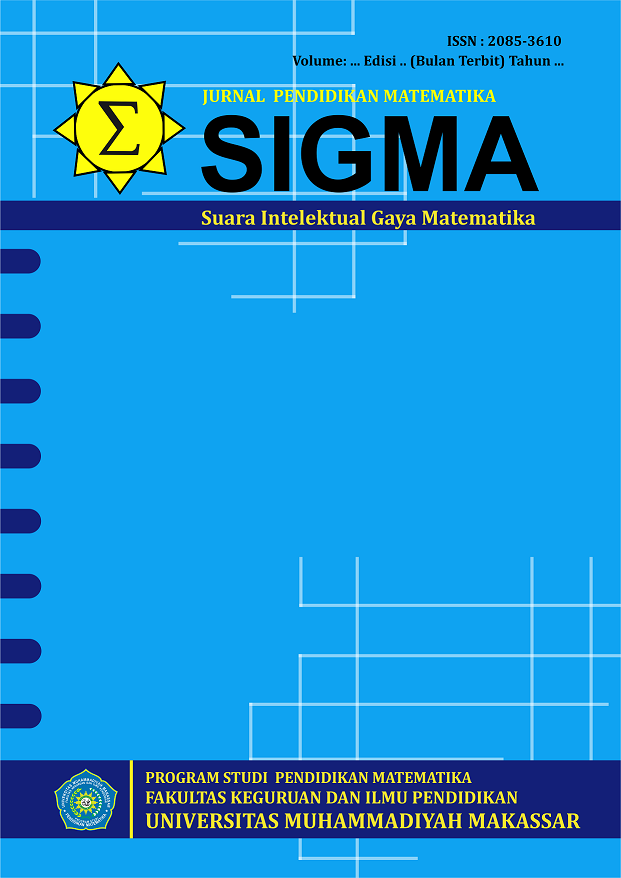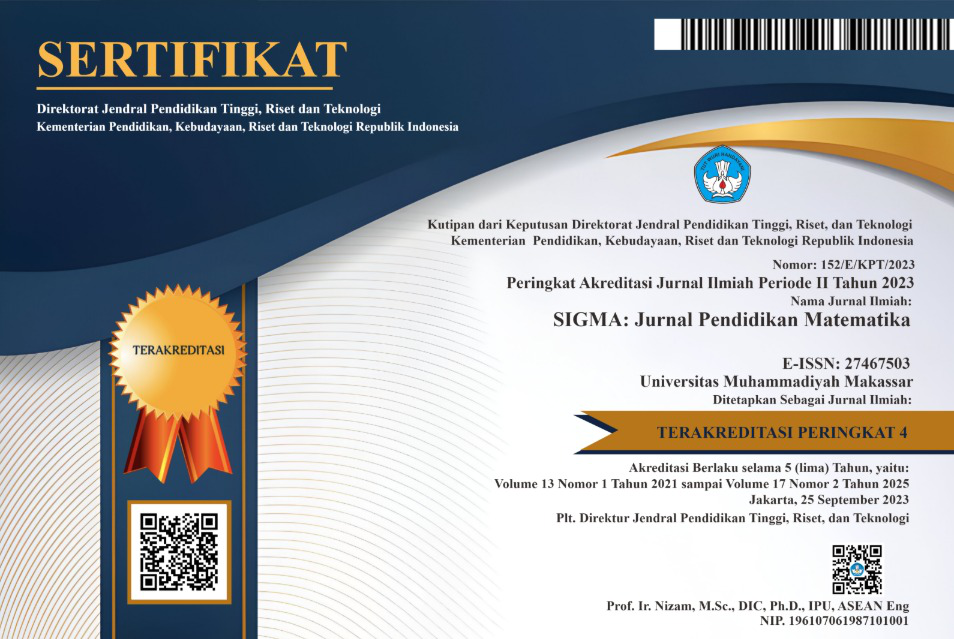DEVELOPMENT OF MATHEMATICS LEARNING TOOLS BASED ON COGNITIVE CONFLICT STRATEGIES TO IMPROVE STUDENTS' CRITICAL THINKING SKILLS
DOI:
https://doi.org/10.26618/sigma.v15i2.12776Keywords:
Math, Learning tools, cognitive conflict strategy, critical thinkingAbstract
Learning tools on triangular and quadrilateral materials are very important because they serve as a benchmark for learning success. The low critical thinking ability in Grade VII mathematics suggests that the media used has not been optimized and has limitations. This study aimed to determine the characteristics and applications of mathematics learning tools that incorporate cognitive conflict strategies on triangular and quadrilateral materials that are valid, practical, and effective in improving students' critical thinking skills. The research used an R&D design, and the study was conducted in the fall semester of the 2021/2022 academic year in grade VII of SMP Negeri 2 in Gerokgak. The Plomp device development model is applied in three stages: preliminary research, prototyping, and assessment. A study found that using triangular and quadrilateral learning tools with cognitive conflict strategies in grade VII SMP Negeri 2 Gerokgak improved math critical thinking skills. The student books presented challenging problems, had conflict discussions, and gave feedback. The teacher manuals included tasks to solve problematic scenarios and evaluate students. These tools are effective and practical, and can replace traditional teaching methods.
References
Adnyana, I. M. D. M. (2021). Populasi dan Sampel. In M. Darwin (Ed.), Metode Penelitian Pendekatan Kuantitatif (1st ed., pp. 103–116). CV. Media Sains Indonesia.
Adnyana, I. M. D. M., & Sudaryati, N. L. G. (2022). The potency of green education-based blended learning in biology students at the Hindu University of Indonesia. Bio-Inoved: Jurnal Biologi-Inovasi Pendidikan, 4(1), 1–9. https://doi.org/10.20527/bino.v4i1.11047
Adnyani, L. P. A. P. (2020). Applying Cognitive Conflict Strategy to Develop Mathematical Critical Thinking Ability and Character of Students. JME (Journal of Mathematics Education), 5(1), 1–13. https://doi.org/10.31327/jme.v5i1.1174
Agus, I., & Purnama, A. N. (2022). Kemampuan Berpikir Kritis Matematika Siswa: Studi pada Siswa SMPN Satu Atap. Jurnal Pendidikan Matematika Raflesia, 07(01), 65–74. https://ejournal.unib.ac.id/index.php/jpmr/article/view/20143/9794
Ahdhianto, E., Marsigit, M., Haryanto, H., & Nurfauzi, Y. (2020). Improving Fifth-Grade Students’ Mathematical Problem-Solving and Critical Thinking Skills Using Problem-Based Learning. Universal Journal of Educational Research, 8(5), 2012–2021. https://doi.org/10.13189/ujer.2020.080539
Andayani, S. (2020). Development of Learning Tools Based on Discovery Learning Models Combined with Cognitive Conflict Approaches to Improve Students’ Critical Thinking Ability. Jurnal Penelitian Pendidikan IPA, 6(2), 238–242. https://doi.org/10.29303/jppipa.v6i2.438
Darling-Hammond, L., Flook, L., Cook-Harvey, C., Barron, B., & Osher, D. (2020). Implications for educational practice of the science of learning and development. Applied Developmental Science, 24(2), 97–140. https://doi.org/10.1080/10888691.2018.1537791
Darmawati, Y., & Mustadi, A. (2023). The Effect of Problem-Based Learning on the Critical Thinking Skills of Elementary School Students. Jurnal Prima Edukasia, 11(2), 142–151. https://doi.org/10.21831/jpe.v11i2.55620
Darwin, M., Mamondol, M. R., Sormin, S. A., Nurhayati, Y., Tambunan, H., Sylvia, D., Adnyana, I. M. D. M., Prasetiyo, B., Vianitati, P., & Gebang, A. A. (2021). Quantitative approach research method (T. S. Tambunan, Ed.; 1st ed.). CV Media Sains Indonesia.
Dickens, O. N., Simon, K., & Madrine, K. (2020). Manifestations and meanings of cognitive conflict among mathematics students in Embu, Kenya. Educational Research and Reviews, 15(11), 690–699. https://doi.org/10.5897/ERR2020.4061
Dong, M., Li, F., & Chang, H. (2023). Trends and hotspots in critical thinking research over the past two decades: Insights from a bibliometric analysis. Heliyon, 9(6), e16934. https://doi.org/10.1016/j.heliyon.2023.e16934
Dwi Rohmawati, A., & Fathoni, A. (2022). Improving Elementary School Student’s Critical Thinking Skills through HOTS-Based Mathematics Question. International Journal of Elementary Education, 6(3), 631–637. https://doi.org/10.23887/ijee.v6i4.55892
Evendi, E., Al Kusaeri, A. K., Pardi, M. H. H., Sucipto, L., Bayani, F., & Prayogi, S. (2022). Assessing students’ critical thinking skills viewed from cognitive style: Study on implementation of problem-based e-learning model in mathematics courses. Eurasia Journal of Mathematics, Science and Technology Education, 18(7), em2129. https://doi.org/10.29333/ejmste/12161
Fadilla, N., Nurlaela, L., Rijanto, T., Ariyanto, S. R., Rahmah, L., & Huda, S. (2021). Effect of problem-based learning on critical thinking skills. Journal of Physics: Conference Series, 1810(1), 012060. https://doi.org/10.1088/1742-6596/1810/1/012060
Firmanti, P. (2022). Student’s Cognitive Conflict in Geometry Learning. Al-Ishlah: Jurnal Pendidikan, 14(3), 4713–4722. https://doi.org/10.35445/alishlah.v14i3.2236
Harizah, Z., Kusairi, S., & Latifah, E. (2020). Student’s critical thinking skills in interactive demonstration learning with web based formative assessment. Journal of Physics: Conference Series, 1567(4), 042038. https://doi.org/10.1088/1742-6596/1567/4/042038
Hendrajah, A. D., Yerizon, Y., & Arnawa, I. M. (2023). Development of Mathematics Learning Tools Based on Realistic Mathematics Education to Improve Mathematical Critical Thinking Ability for Class VII Middle School. Journal of Social Research, 2(10), 3636–3642. https://doi.org/10.55324/josr.v2i10.1435
Hidayah, R., Salimi, Moh., & Susiani, T. S. (2017). Critical thinking skill: konsep dan inidikator penilaian. Taman Cendekia: Jurnal Pendidikan Ke-SD-An, 1(2), 127–133. https://doi.org/10.30738/tc.v1i2.1945
Hidayati, N., Suryanti, S., & Cahaya, N. (2023). The Potential for the Development of Critical Thinking Tests: An Overview of Educators’ Perceptions. Jurnal Kependidikan: Jurnal Hasil Penelitian Dan Kajian Kepustakaan Di Bidang Pendidikan, Pengajaran Dan Pembelajaran, 9(1), 56. https://doi.org/10.33394/jk.v9i1.6794
Ismail, Suwarsono, St., & Lukito, A. (2018). Critical thinking skills of junior high school female students with high mathematical skills in solving contextual and formal mathematical problems. Journal of Physics: Conference Series, 953, 012205. https://doi.org/10.1088/1742-6596/953/1/012205
Juwita, R., & Fauzan, A. (2020). Preliminary Reasearch Development of Mathematics Learning Device Based on Cognitive Conflict to Improve Critical Thinking Ability of 1st Grade Senior High School Students. Journal of Physics: Conference Series, 1554(1), 012018. https://doi.org/10.1088/1742-6596/1554/1/012018
Karyadi Hidayat, Sapriya, Hasan, S. H., & Wiyanarti, E. (2023). Social Learning E-Module for Optimizing Critical Thinking Skills. Journal of Education Technology, 7(1), 166–176. https://doi.org/10.23887/jet.v7i1.59798
Kaur, B., Yeap, B., & Kapur, M. (2009). Mathematical Problem Solving: Yearbook 2009, Association of Mathematics Educator. World Scientific.
Like Triyanti, P., Noer, H., & Sutiarso, S. (2021). Scaffolding based treffinger to improve students’ critical thinking skills. Journal of Educational Research and Evaluation, 5(3), 414–421. https://doi.org/10.23887/jere.v5i3.32469
Makhrus, Muh., & Hidayatullah, Z. (2021). The Role of Cognitive Conflict Approach to Improving Critical Thinking Skills and Conceptual Understanding in Mechanical Waves. Formatif: Jurnal Ilmiah Pendidikan MIPA, 11(1). https://doi.org/10.30998/formatif.v11i1.8142
Mania, S., Jamaluddin, N., Kusumayanti, A., & Nur, F. (2021). The development of student worksheets using ethnomatematics based prediction, observation, and explanation learning models to improve student’s critical thinking ability. Desimal: Jurnal Matematika, 4(2), 203–216. https://doi.org/10.24042/djm.v4i2.8306
Mufit, F., Asrizal, A., Puspitasari, R., & Annisa N, A. (2022). Cognitive Conflict-Based E-Book with Real Experiment Video Analysis Integration to Enhance Conceptual Understanding of Motion Kinematics. Jurnal Pendidikan IPA Indonesia, 11(4), 626–639. https://doi.org/10.15294/jpii.v11i4.39333
OECD. (2019). OECD Programme for International Student Assessment (PISA). PISA 2018 Insights and Interpretations. https://www.oecd.org/pisa/publications/pisa-2018-results.htm
Pratiwi, E., Nusantara, T., Susiswo, S., & Muksar, M. (2022). Routines’ errors when solving mathematics problems cause cognitive conflict. International Journal of Evaluation and Research in Education, 11(2), 773–779. https://doi.org/10.11591/ijere.v11i2.21911
Putra, R., Fauzan, A., & Habibi, M. (2020). The impact of cognitive conflict-based learning tools on students` mathematical problem-solving ability. International Journal of Educational Dynamics, 2(1), 209–218. https://doi.org/10.24036/ijeds.v2i1.247
Rahayu, S., & Fauzan, A. (2020). The Development of Math’s Learning Materials Based on Cognitive Conflict for the Students at Junior High Schools. Proceedings of the 2nd International Conference Innovation in Education (ICoIE 2020), 235. https://doi.org/10.2991/assehr.k.201209.235
Rahayu, S., Fauzan, A., Yerizon, Y., & Arnawa, I. M. (2022). The Development of Learning Device Based on Cognitive Conflict to Improve Mathematics Problem Solving Skills for Students in Madrasah Tsanawiyah. Jurnal Gantang, 7(1), 91–98. https://doi.org/10.31629/jg.v7i1.4416
Ratnaningtyas, Y. (2016). Kemampuan berpikir kritis siswa SMP kelas VIII dalam menyelesaikan soal higher order thinking ditinjau dari kemampuan matematika. MATHEdunesa, 5(1), 25–35. https://doi.org/10.26740/mathedunesa.v5n1.p%25p
Sayce, L. (2009). The Route to Cognitive Conflict (A Planning Toolkit for Teachers). In Reading Borough Council and NCETM.
Shahbari, J. A. (2021). Cognitive Conflict in Technological Environment: Cognitive Process and Emotions through Intuitive Errors in Area, Perimeter and Volume. Mathematics, 9(14), 1672. https://doi.org/10.3390/math9141672
Siagian, M. D. (2016). Kemampuan koneksi matematik dalam pembelajaran matematika. MES: Journal of Mathematics Education and Science, 2(1), 58–67. https://doi.org/10.30743/mes.v2i1.117
Suryawan, I. P. P., Nitiasih, P. K., Riastini, P. N., & Sudiarta, I. G. P. (2023). Controversial mathematical issues: problem-based learning on critical thinking. Jurnal Kependidikan: Jurnal Hasil Penelitian Dan Kajian Kepustakaan Di Bidang Pendidikan, Pengajaran Dan Pembelajaran, 9(3), 808. https://doi.org/10.33394/jk.v9i3.8210
Suryawan, I. P. P., Sudiarta, I. G. P., & Suharta, I. G. P. (2023). Students’ Critical Thinking Skills in Solving Mathematical Problems: Systematic Literature Review. Indonesian Journal of Educational Research and Review, 6(1), 120–133. https://doi.org/10.23887/ijerr.v6i1.56462
Syadzili, A. F., Soetjipto, & Tukiran. (2018). Guided Inquiry with Cognitive Conflict Strategy: Drilling Indonesian High School Students’ Creative Thinking Skills. Journal of Physics: Conference Series, 947, 012046. https://doi.org/10.1088/1742-6596/947/1/012046
Tohir, M., Maswar, M., Mukhlis, M., Sardjono, W., & Selviyanti, E. (2021). Prospective teacher’s expectation of students’ critical thinking process in solving mathematical problems based on Facione stages. Journal of Physics: Conference Series, 1832(1), 012043. https://doi.org/10.1088/1742-6596/1832/1/012043
Yolanda, F. (2019). The Effect of Problem Based Learning on Mathematical Critical Thinking Skills of Junior High School Students. Journal of Physics: Conference Series, 1397(1), 012082. https://doi.org/10.1088/1742-6596/1397/1/012082
Downloads
Additional Files
Published
Issue
Section
License
With the receipt of the article by the SIGMA: Jurnal Pendidikan Matematika Editorial Board and the decision to be published, then the copyright regarding the article will be diverted to SIGMA: Jurnal Pendidikan Matematika.
Universitas Muhammadiyah Makassar as the publisher of SIGMA: Jurnal Pendidikan Matematika hold the copyright regarding all the published articles in this journal.Universitas Muhammadiyah Makassar has the right to multiply and distribute the article and every author is not allowed to publish the same article that was published in this journal.
The manuscript authentic and copyright statement submission can be downloaded ON THIS FORM.






